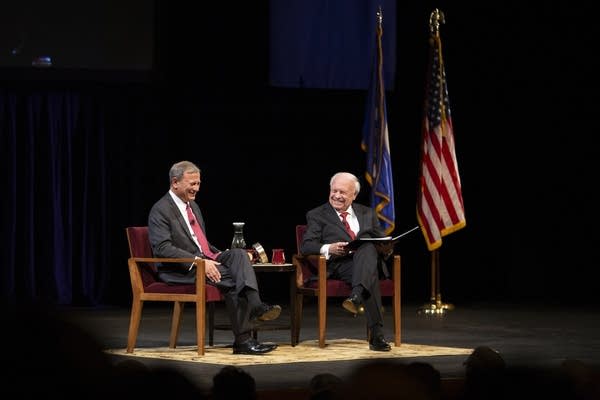Chief Justice Roberts: Court's past errors stemmed from giving in to politics

Chief Justice John Roberts defended the independence of the federal judiciary in the wake of a tense confirmation battle for Associate Justice Brett Kavanaugh to the U.S. Supreme Court. Roberts was at the University of Minnesota Tuesday as part of a lecture series with the law school, an appearance scheduled long before the hearings.
Senators confirmed the new justice narrowly this month after Christine Blasey Ford testified that Kavanaugh sexually assaulted her when they were in high school, which Kavanaugh denied.
Roberts did not discuss details of the confirmation hearings, and he declined to criticize lawmakers or President Trump. But ahead of an interview with University of Minnesota law professor Robert Stein, the chief justice addressed what he called "the contentious events in Washington of recent weeks."
He said the Supreme Court's role is clear — to be an independent arbiter of the U.S. Constitution.
Create a More Connected Minnesota
MPR News is your trusted resource for the news you need. With your support, MPR News brings accessible, courageous journalism and authentic conversation to everyone - free of paywalls and barriers. Your gift makes a difference.
"Without independence, there is no Brown v. Board of Education. Without independence there is no West Virginia v. Barnette, where the court held that the government could not compel school children to salute the flag," Roberts said.
The chief justice said some of the court's most grievous errors came when his predecessors caved to political pressure. He cited the 1944 Korematsu decision upholding the internment of American citizens of Japanese descent.
Now part of a conservative majority, Roberts also emphasized the collegiality of the high court.
"There aren't many jobs where everybody is doing exactly the same thing. We read the same briefs, we go to the same arguments, we read the same cases. And that does cause a real bond to develop."
Asked if there was ever a chill in the room after a particularly divisive 5-4 decision, Roberts said no. There are controversial cases every year, and with lifetime tenure, personal animosities over legal differences would make for a long and frustrating career.

The chief justice — who's been on the court since 2005 — has long said he'd like to see fewer of those splits and more unanimity, but that's a work in progress.
"I still think it's an important objective. I think judicial decisions should be narrower rather than broader. And the way to do that is to get as many people on board as you can."
Professor Stein asked Roberts if he's worried about surveys that show many Americans are unable to name a single Supreme Court justice. Roberts said his bigger concern is ignorance about the court's role as an equal branch of government.
"The lack of knowledge about how the Supreme Court functions, and in particular, how it is different from the political branches, is very unfortunate," Roberts said. "I think too many people think that when we reach a decision on a case, it's pretty much the same as Congress reaching a decision on a question of policy. And of course it's not that at all. It's very different. And people need to know that."
Roberts said when he crafts opinions, he aims to write in a way that can be understood by people who are not lawyers or legal scholars.
"I'm writing for my three sisters. They are not lawyers. They're intelligent laypeople. They're not in Washington. They like to keep up with things in government and civic affairs, but it's not a preoccupation for them," he said. "And I would like somebody in that position to understand what their Supreme Court has done."
Roberts received a warm welcome at Northrop, with standing ovations before and after the talk. There were no protests or disruptions.
Even after the fight over Kavanaugh's confirmation, Roberts promised that the tradition of collegiality will continue, noting that all the justices shake hands ahead of every oral argument and before heading to the conference room to discuss the cases before them.